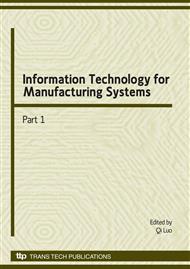[1]
T.R. Gruber. A translation approach to portable ontology specifications. Knowledge Acquisition. Vol. 5 (1993), pp.199-220.
DOI: 10.1006/knac.1993.1008
Google Scholar
[2]
M. Uschold and M. Grüninger. Ontologies: Principles, Methods and Applications. Knowledge Engineering Review. Vol. 11 (1996), pp.93-155.
Google Scholar
[3]
R. Carnap. Empiricism, semantics, and ontology, in: The Philosophy of Science: An Historical Anthology, edited by T. McGrew, M. Alspector-Kelly and F. Allhoff, chapter, 5, John Wiley and Sons Publishers (2009).
Google Scholar
[4]
B. Dunwoodie. What is an Ontology? And Why We Need Them. Proceedings of the 10th International Protégé Conference (2007).
Google Scholar
[5]
R. Jasper and M. Uschold. A Framework for understanding and classifying ontology applications. Proceedings of the IJCAI-99 ontology workshop (1999), pp.1-20.
Google Scholar
[6]
N.F. Noy and D.L. McGuinness. Ontology Development 101: A Guide to Creating Your First Ontology. Stanford Knowledge Systems Laboratory Technical Report (2001).
Google Scholar
[7]
A.D. Diehl, J.A. Lee, R.H. Scheuermann and J.A. Blake. Ontology development for biological systems: immunology. Bioinformatics. Vol. 23 (2007), pp.913-915.
DOI: 10.1093/bioinformatics/btm029
Google Scholar
[8]
S.L. Nimmagadda and H. Dreher. Mapping and Modeling of Oil and Gas Relational Data Objects for Warehouse Development and Efficient Data Mining. IEEE International Conference on Industrial Informatics (2006), pp.1201-1206.
DOI: 10.1109/indin.2006.275809
Google Scholar
[9]
S. Bechhofer, F. van Harmelen, J. Hendler, I. Horrocks, and et al. OWL Web Ontology Language Reference. W3C Recommendation (2004).
Google Scholar
[10]
B. Cuenca-Grau, I. Horrocks, B. Motik, B. Parsia, and et al. OWL 2: The next step for OWL. Journal of Web Semantics. Vol. 6 (2008), pp.309-322.
DOI: 10.1016/j.websem.2008.05.001
Google Scholar
[11]
J.H. Gennari, M.A. Musen, R.W. Fergerson, and et al. The evolution of Protégé: an environment for knowledge-based systems development. International Journal of Human-Computer Studies. Vol. 58 (2003), pp.89-123.
DOI: 10.1016/s1071-5819(02)00127-1
Google Scholar
[12]
The Protégé Ontology Editor and Knowledge Acquisition System. Information on http: /protege. stanford. edu.
Google Scholar
[13]
I. Horrocks and P.F. Patel-Schneider. FaCT and DLP. Automated Reasoning with Analytic Tableaux and Related Methods (1998), pp.27-30.
DOI: 10.1007/3-540-69778-0_5
Google Scholar
[14]
V. Haarslev, and R. Moller. Description of the RACER System and its Applications. In Proceedings of the International Workshop on Description Logics (2001), pp.1-3.
Google Scholar


